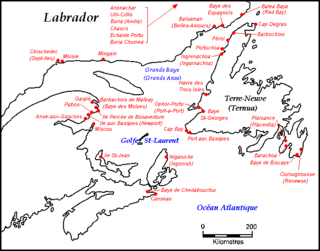Algonquian–Basque pidgin
Pidgin language last attested in 1711, in Canada From Wikipedia, the free encyclopedia
Algonquian–Basque pidgin, also known as Souriquois,[2] is a Basque-based pidgin proposed by linguist Peter Bakker to have been spoken by Basque whalers and various Algonquian peoples.[1] It was spoken around the Gulf of Saint Lawrence. It was in use from at least 1580 until 1635,[2] and was last attested in 1711.[1][page needed]
You can help expand this article with text translated from the corresponding article in Basque. (July 2014) Click [show] for important translation instructions.
|
| Algonquian–Basque pidgin | |
|---|---|
| Souriquois | |
| Region | Gulf of St. Lawrence |
| Ethnicity | Basques, local Algonquian peoples |
| Era | 16th to 18th century[1] |
Basque-based pidgin | |
| Language codes | |
| ISO 639-3 | None (mis) |
qba | |
| Glottolog | basq1252 |
 Basque and Breton fishing sites in 16th and 17th centuries. | |
There were three groups of First Nations that the Basque people distinguished. The ones with which they had good relations were the Montagnais and the St. Lawrence Iroquoians. They also knew of the Inuit, whom they considered hostile. The Basque people referred to them as the Montaneses, the Canaleses, and the Esquimoas, respectively.[3]
Vocabulary
| Pidgin | Original language | English translation |
|---|---|---|
| Normandia | Normandia (Basque), 'Normandy' | French |
| kir | kir (Mi'kmaq) | you |
| ania | anaia (Basque) | brother |
| capitana | capitaina (Basque), kapitaina in Standard Basque | captain |
| endia | andia (Basque), handia in Standard Basque | large |
| chave | chave (Romance) | know |
| ouias | wiya:s (Innu-aimun) | meat |
| amiscou | amisku (Innu-aimun) | beaver |
See also
References
Further reading
Wikiwand - on
Seamless Wikipedia browsing. On steroids.
